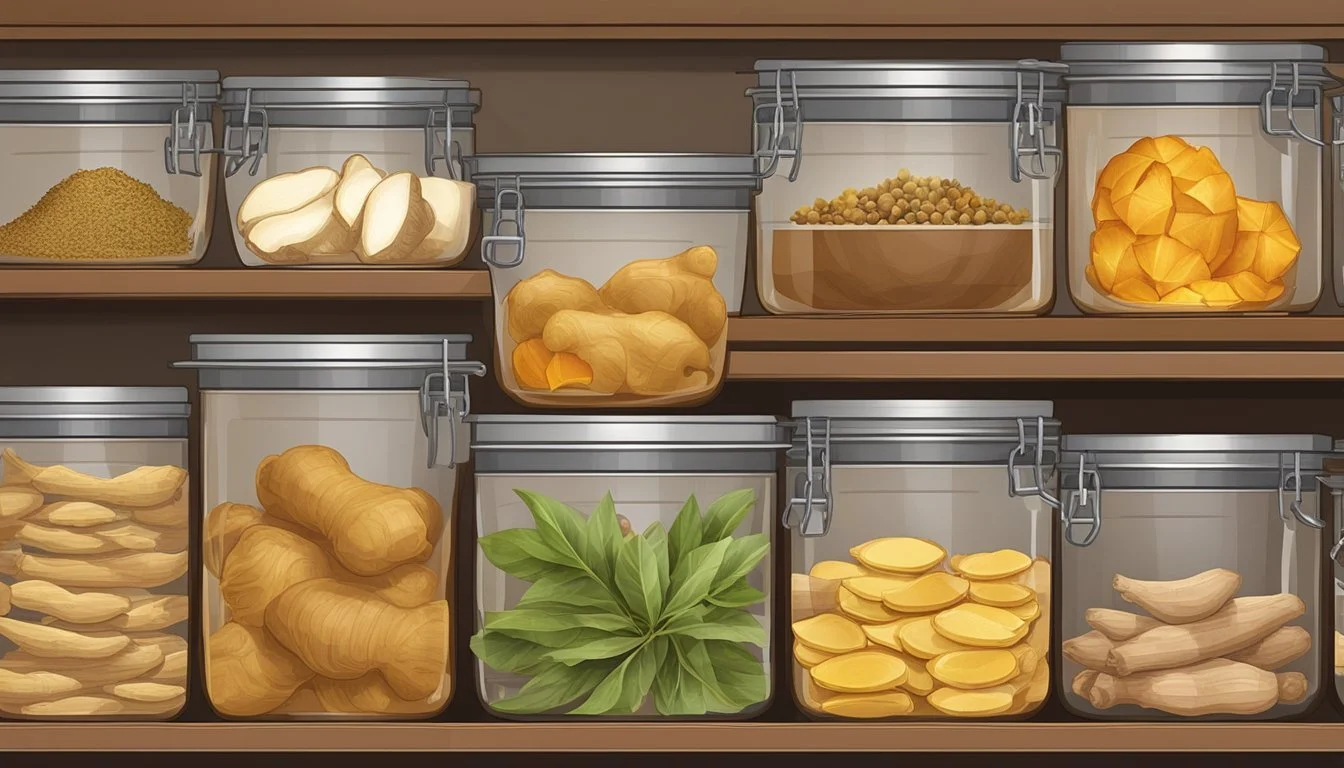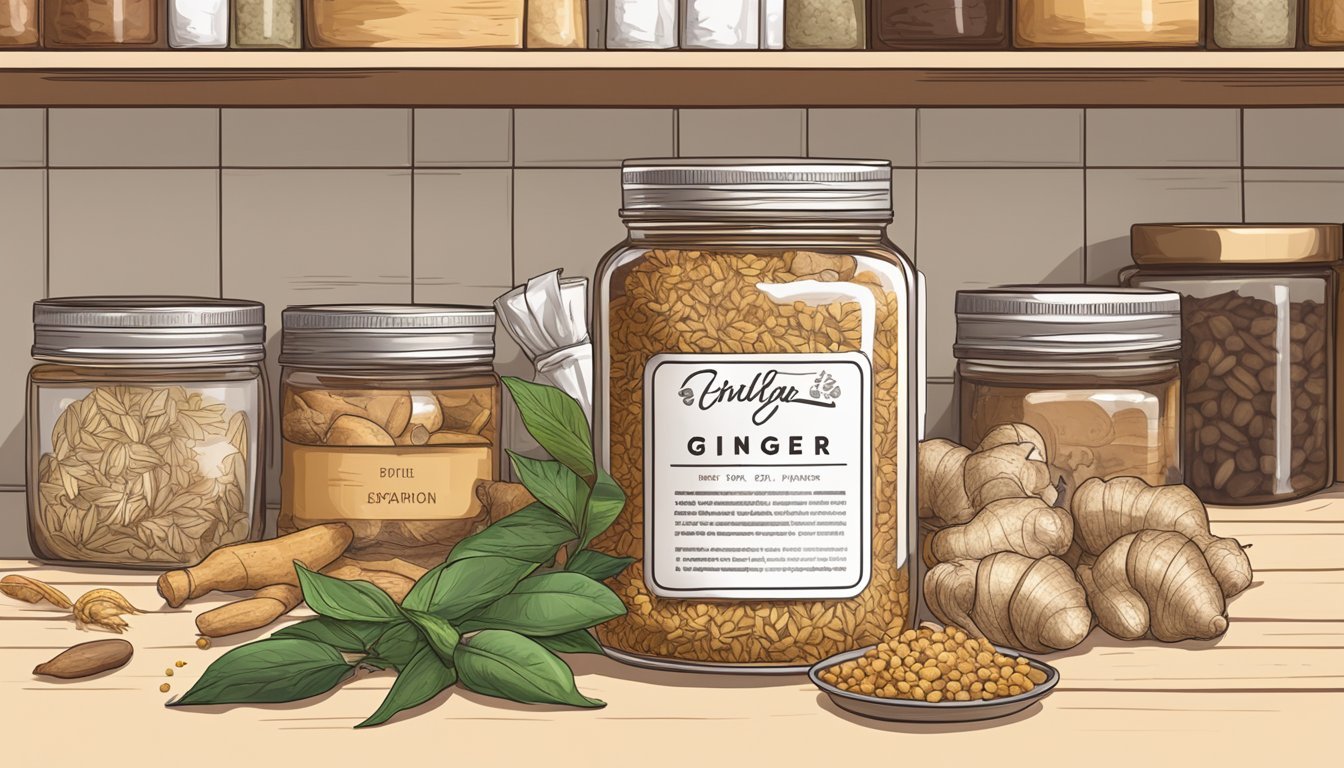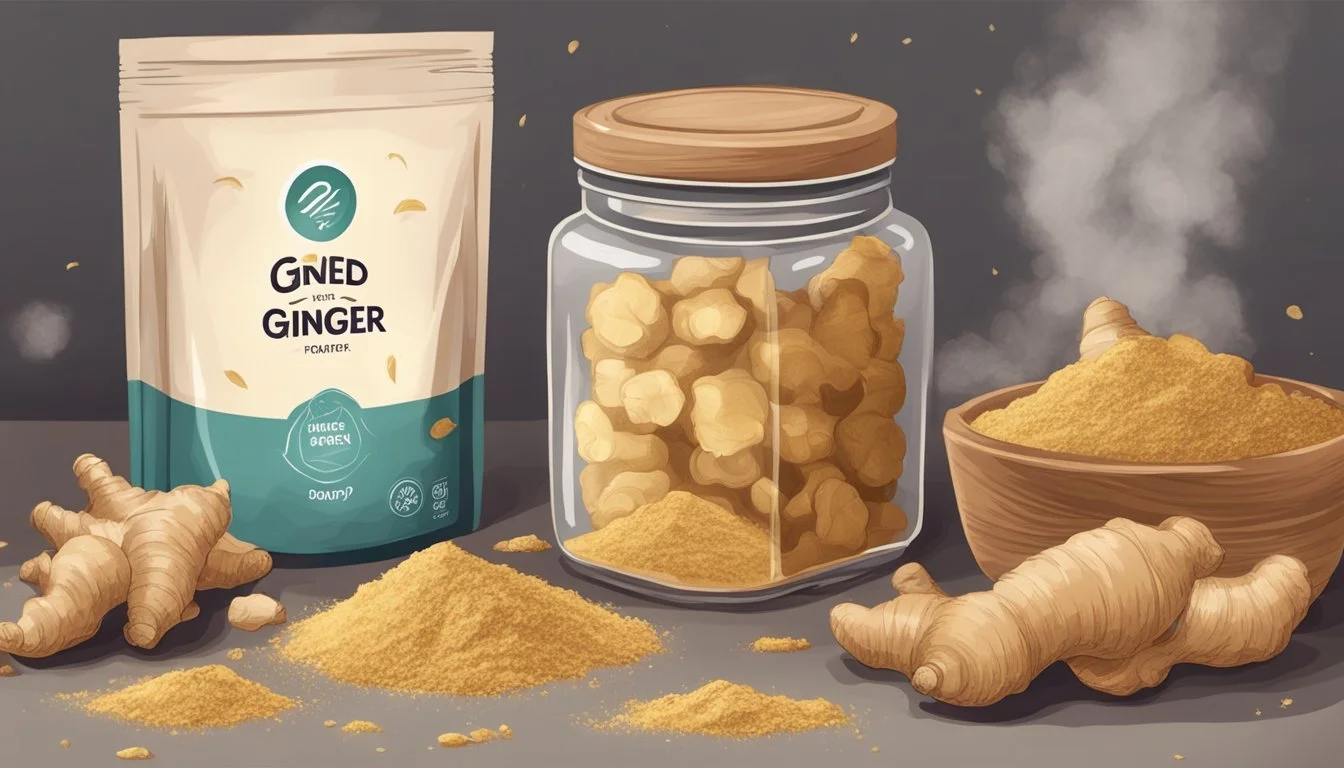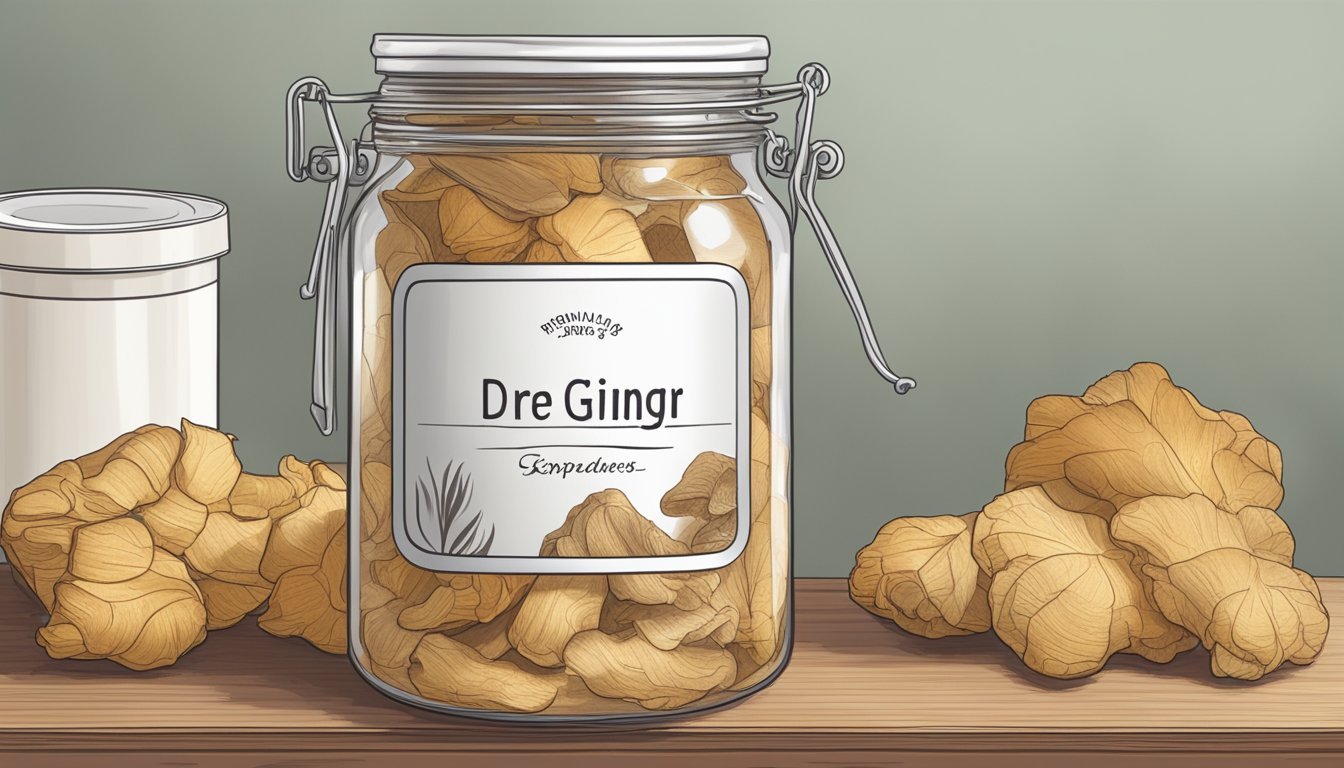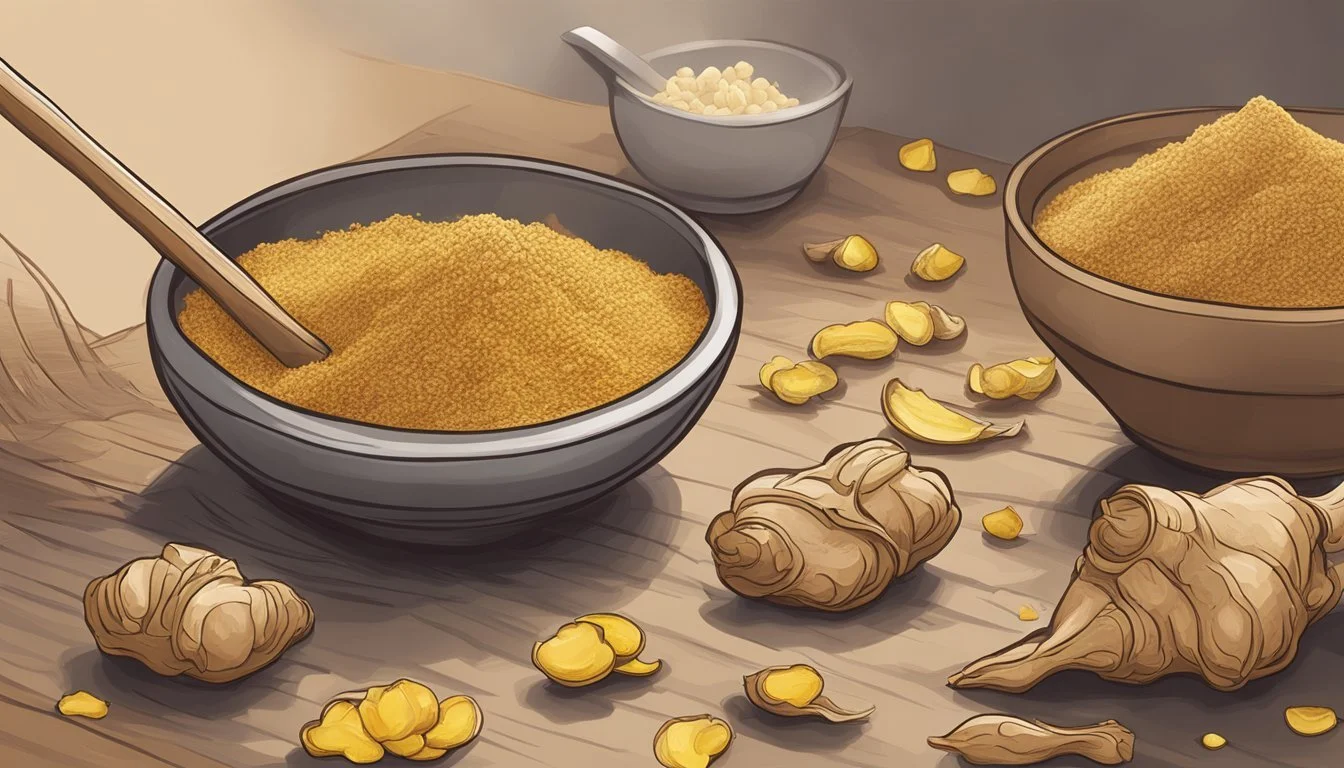How Long Does Dried Ginger Last?
Understanding Shelf Life and Storage Tips
Ginger, treasured for both its culinary and medicinal properties, has been a part of human consumption for millennia. Its pungent flavor and health benefits extend from its fresh form to its dried counterpart. Dried ginger (how long does dried ginger last?), available as whole, sliced, or ground, is a staple in various cuisines and a common ingredient in spice blends and teas.
The shelf life of dried ginger is remarkably long when compared to its fresh counterpart. Proper storage plays a crucial role in preserving the longevity and potency of dried ginger. Kept in a cool, dry place away from direct sunlight, dried ginger maintains its quality. In its optimal state, dried ginger can last several years without a significant loss in flavor or aroma.
However, despite its durability, dried ginger can deteriorate in quality over time. Signs that it is past its prime include loss of aroma, a decrease in the pungency of taste, and a change in appearance. To maximize the use of dried ginger, consumers are encouraged to monitor these characteristics and renew their supply as needed to ensure the best flavor for their culinary applications.
Overview of Ginger
Ginger is a versatile spice known for its distinctive flavor and numerous health benefits that has been cherished across many cultures for centuries. It comes in various forms, each with unique applications in cooking and baking.
Historical Background
Ginger, belonging to the Zingiberaceae family, originated in Southeast Asia. It has been used since ancient times, not only as a spice but also for its medicinal properties. Historical records show that ginger was a valuable commodity in the Roman Empire, traded extensively across the known world.
Health Benefits
The health benefits of ginger are well-documented. It contains compounds that can alleviate nausea and aid digestion. Research also suggests that ginger can reduce inflammation and may have anti-cancer properties. However, it's crucial to consult healthcare providers for advice on therapeutic uses.
Types of Ginger
Fresh Ginger: A knobby, beige rhizome with a pungent and spicy flavor.
Dried Ginger: Less spicy than fresh, it has a slightly sweet undertone.
Pickled Ginger: (how long does pickled ginger last?) Often served with sushi, it has a tangy-sweet flavor.
Crystallized Ginger (how long does crystallized ginger last?): Ginger cooked in sugar (how long does sugar last?) syrup and coated with granulated sugar.
Ground Ginger: Made from dried ginger, this powder is commonly used in baking and cooking.
Uses in Cooking and Baking
Ginger's unique flavor makes it a staple in many culinary traditions. It serves as a key ingredient in savory dishes, marinades, and sauces. In baking, ginger adds warmth and spice to recipes such as gingerbread and pumpkin pie. Its adaptability enhances both sweet and savory dishes, making it an indispensable spice in kitchens around the world.
Storing Ginger
Proper storage of ginger maximizes its shelf life and preserves its pungent flavor and medicinal properties. The storage method varies depending on its form—fresh, peeled, or processed into ginger paste.
Fresh Ginger Storage
Fresh ginger root should be stored in a cool, dark place such as a pantry or drawer to maintain its freshness. For prolonged storage, placing unpeeled ginger in the fridge in an airtight container or resealable plastic bag with the air removed can extend its life for more than a month.
Peeling and Cutting Fresh Ginger
Once ginger is peeled or cut, its shelf life decreases. Storing peeled or sliced ginger should be done in the refrigerator, wrapped tightly in cling film or stored in an airtight container, and should be used within 2-3 weeks.
Freezing Ginger
Freezing ginger is an excellent way to extend its shelf life. Whole, unpeeled ginger root can be stored in the freezer for 4-6 months. One can also freeze grated ginger or ginger slices laid out on a tray before transferring to an airtight container to prevent clumping.
Storing Ginger Paste
For ginger paste, it should be kept in an airtight container in the fridge and used within a month for best quality. For longer preservation, one can freeze the paste in ice cube trays and then store in freezer bags, which allows for easy use in cooking.
Dried Ginger Shelf Life
Dried ginger typically retains its quality for up to two to three years if stored properly. The length of time dried ginger maintains its potency, aroma, and flavor is influenced by various factors, including storage conditions and the form of the dried ginger.
Assessing Quality
To determine if dried ginger is still of good quality, one should look for signs of potency loss or deterioration. High-quality dried ginger has a strong, spicy aroma and a robust, warm flavor. If the dried ginger exhibits a weak scent, a dull flavor, or a powdery, crumbly texture, these may indicate that it has lost its quality. Visible mold or an off smell are clear indicators that the ginger should no longer be used.
Factors Affecting Potency
Several factors affect the potency and durability of dried ginger:
Exposure to light: Dried ginger should be stored away from direct sunlight, as light can degrade its quality.
Temperature fluctuations: Consistent, cool temperatures help maintain its potency.
Humidity: Dry environments prevent the introduction of moisture, which can lead to mold growth.
Air exposure: Minimizing air exposure preserves flavor and aroma.
Optimizing Shelf Life
To optimize the shelf life of dried ginger, one should consider the following storage tips:
Keep in airtight containers to reduce air exposure and control humidity.
Store in a cool, dark place such as a pantry or cupboard.
Check regularly for any signs of quality degradation, such as changes in texture, aroma, or the presence of mold.
Refer to the expiry date as a general guideline but rely on sensory indicators for a more accurate assessment.
By following these guidelines, dried ginger can be preserved to maintain its characteristic zest for an extended period, ensuring it remains a flavorful addition to various dishes.
Proper Storage Conditions
Proper storage extends the shelf life of dried ginger by maintaining its flavor and preventing spoilage. Key considerations involve temperature, humidity, light, and container selection.
Temperature and Humidity Controls
Maintaining a cool, dry environment is crucial for the preservation of dried ginger. Ideal conditions are found in a pantry or cupboard away from sources of heat, where room temperature is consistently maintained.
Temperature: Ideally, store at room temperature around 60-70°F (15-21°C).
Humidity: Keep air moisture at bay, as it can lead to spoilage.
Light Exposure
Protecting dried ginger from light prevents the degradation of its quality.
Store in a dark place, away from direct sunlight which can cause loss of flavor and potency.
Airflow and Containers
The right container and proper airflow are essential in preserving dried ginger's quality.
Containers: Use air-tight containers to prevent exposure to air and moisture.
Airflow: While moisture buildup is to be avoided, some airflow can prevent condensation, especially in very humid environments.
Selecting the correct storage approach ensures the dried ginger retains its robust flavor and health benefits for a longer period.
Recognizing Spoilage
When assessing dried ginger for spoilage, one should focus on specific changes in appearance, smell, and texture. These indicators are reliable measures to ensure that the ginger is safe for consumption and has not gone bad.
Visual and Olfactory Indicators
Spoilage in dried ginger can often be detected through visual and olfactory cues. If the dried ginger has lost its vibrant color and appears dull, this may be a sign of degradation. A musty or off-putting smell is a clear indicator that the ginger may no longer be suitable for use. Fresh dried ginger typically has a pungent, spicy aroma and any deviation should cause suspicion.
Texture and Mold Growth
The texture of the ginger is another critical aspect to examine. Dried ginger should be firm to the touch and free from moisture. A moist texture can lead to mold growth, which usually presents as discolored fuzzy spots in various shades like green, white, or black. Consuming moldy ginger should be avoided as it indicates that the product is no longer fresh and could be harmful.
Health Considerations
The shelf life of dried ginger is not only a culinary concern but also a health matter, as its longevity affects its potency and benefits. Dried ginger retains its health properties when stored properly, providing anti-inflammatory effects and aiding digestion.
Anti-Inflammatory Properties
Dried ginger contains compounds like gingerol, which exhibit anti-inflammatory properties. When stored correctly, these compounds remain active for extended periods, potentially reducing inflammation related to conditions like osteoarthritis. However, effectiveness may diminish if the ginger is stored improperly or kept beyond its advisable shelf life.
Digestive Benefits
Ginger has been traditionally recognized to support digestive health. The active components in dried ginger can help stimulate saliva production and suppress gastric contractions, easing the digestive process. To maintain these benefits, one should ensure their dried ginger is stored in a cool, dry place, away from direct sunlight.
Preservation Methods
Proper preservation methods extend the shelf-life of dried ginger by preventing spoilage and maintaining its potency. By employing techniques involving salt, sugar, or alcohol, one can ensure that dried ginger maintains its flavors and health benefits over an extended period. Dry storage techniques also play a crucial role in longevity.
Using Salt and Sugar
Salt:
Salt acts as a desiccant, absorbing moisture that could otherwise lead to mold or bacterial growth. Dried ginger can be stored with salt using the following steps:
Layer the bottom of a plastic container with salt.
Wrap the dried ginger in a paper towel.
Place the wrapped ginger atop the salt layer and seal the container.
Store away from direct sunlight to prolong its lifespan.
Sugar:
Sugar, similar to salt, helps in preserving dried ginger by creating an environment that inhibits microbial growth through osmosis.
Mix dried ginger with sugar to create a ginger sugar that can be used for baking or flavoring tea.
Ensure that the mixture is stored in an airtight container, away from moisture and sunlight.
Alcohol Preservation
Alcohol:
Ethanol in alcohol is an effective preservative that can keep dried ginger fresh:
Submerge the ginger entirely in alcohol such as vodka or dry sherry.
The ginger should be stored in a sealed jar and placed in a cool, dark place.
Alcohol-preserved ginger can also be used to add a flavored kick to dishes and beverages.
Dry Storage Techniques
Careful storage techniques can help preserve the quality of dried ginger:
Store in an airtight, moisture-proof container to ensure dryness.
Check periodically for any signs of spoilage or moisture.
Keep the dried ginger in a dark, cool place to avoid deterioration from heat and sunlight.
Using these methods, one can effectively preserve dried ginger and enjoy its aromatic flavor and health benefits for a longer duration.
Culinary Uses
Dried ginger imparts a concentrated, spicy flavor to various dishes and beverages, making it a versatile ingredient in cooking and drink-making. Its preservation through drying extends its shelf life, ensuring its robust taste can be enjoyed year-round.
Ginger in Recipes
Ginger adds a warm, spicy kick to recipes, elevating the flavor profile of dishes. In cooking, it is often used in powdered form to season meats, spice up curries, or incorporate into spice blends. Chefs frequently include dried ginger in marinades to tenderize proteins while infusing them with flavor. For those enjoying sushi, a sprinkle of ginger powder(how long does ginger powder last?) can enhance the taste without overpowering delicate fish. When using dried ginger, one must adjust quantities, as its flavor is more concentrated than fresh ginger.
Ginger in Drinks
In beverages, dried ginger offers a bold zest. It is notably used in juice blends, where a pinch can transform a simple fruit juice into a more complex drink. Dried ginger also finds its way into the alcohol industry, providing a spicy undertone to gin and other spirits. The strong, peppery taste of dried ginger complements both hot and cold drinks, and can be a key ingredient in homemade syrups for cocktails or non-alcoholic options.
Purchasing Tips
When it comes to purchasing dried ginger, selecting high-quality ginger and knowing where to buy it are crucial steps for ensuring that it lasts as long as possible.
Selecting High-Quality Ginger
Customers should look for firm, heavy roots that are free of mold and soft spots. The skin of the ginger should be taut and clings tightly to the underlying flesh. High-quality ginger is often distinguished by a sharp, peppery aroma when freshly cut. If purchasing dried ginger, one should opt for pieces that are free from moisture and not clumped together.
Where to Buy Ginger
Dried ginger can be found in various locations but is most commonly available at grocery stores and specialty spice shops. When choosing where to buy ginger, one might consider exploring Asian markets or health food stores, as they often offer a wider selection. Some may prefer the convenience of purchasing ginger online from reputable spice retailers who guarantee freshness and quality.
Grinding and Processing
After dehydrating ginger, one can process it into forms ideal for culinary use or long-term storage. Specifically, grinding dehydrated ginger yields ginger powder, a versatile spice with an extended shelf life.
Making Ginger Powder
To create ginger powder, one should start with fully dehydrated ginger to prevent mold growth. The process typically involves:
Pulverization: Transform dried ginger slices or pieces into a fine powder.
Sifting: Sieve the ground ginger to ensure a consistent texture.
Tools and Techniques
For grinding ginger, various tools and techniques are applicable, ensuring efficiency and texture control:
Food Processor:
Suitable for larger batches.
Provides variable speed settings for desired texture.
Coffee or Spice Grinder:
Ideal for achieving a very fine powder.
Quick and convenient for smaller quantities.
By employing the correct tools and methods, one can obtain powdered or ground ginger suitable for culinary needs, which, when stored properly, remains flavorful for several months up to a year.

